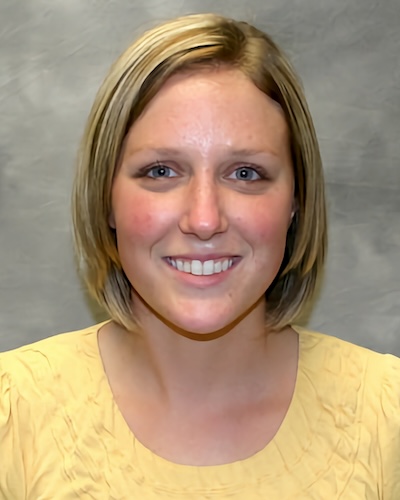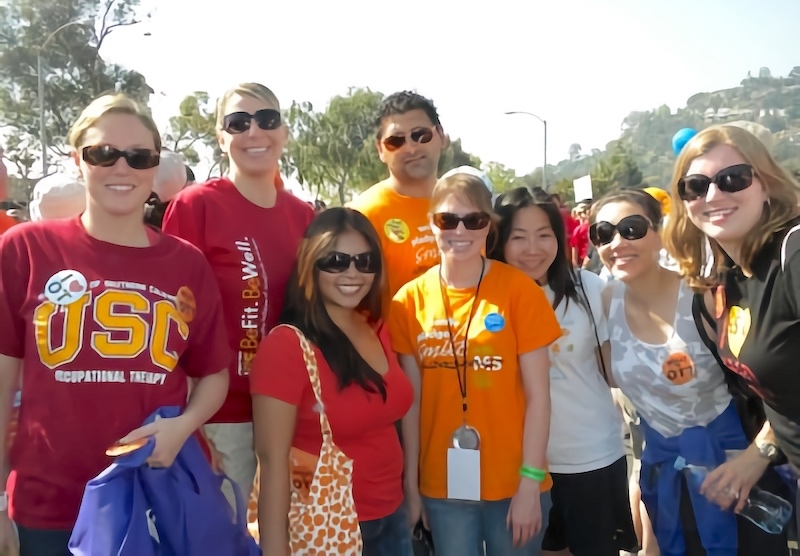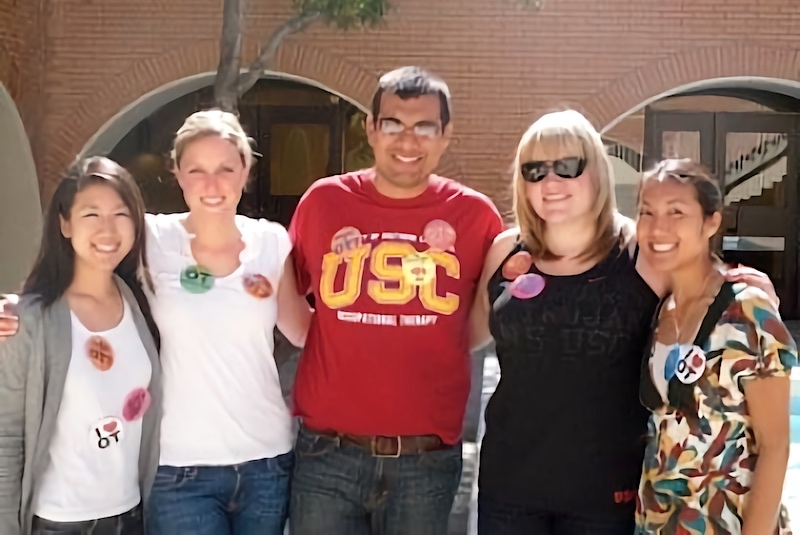Student Blog
Myka

MS Walk ⟩
April 27, 2010, by Myka
Classes Getting Involved What are OS/OT?
I had a great time walking in the MS walk with other students and clients from my Optimal Living with MS class.
This semester, I’ve been taking a class with clients with Multiple Sclerosis, an autoimmune disease that affects the brain and spinal cord. Many of these people have difficulties doing what they want and need to do, and often have fatigue and weakness. This is a 12-week course run by the MS Society, and participants come to USC and work with OT students in the morning, and PT students in the afternoon. We led groups for them such as Roles and Identity, Meaningful Activities, Adaptive Equipment, Energy Conservation, Stress Management, and Time Management, among others. I led the group on Advocacy and Assertiveness, which was really fun! A neat part of the class was the opportunity to meet with PT students who are also taking the class, and get to talk to them about what OT does for this population.
We just finished the class, and all of the participants shared their feelings about the experience. Nearly all of them stated that they came to the class to receive physical therapy, and didn’t even know what occupational therapy was! However, over the course of the twelve weeks, they came to really appreciate the unique role of OT in their illness management and health optimization. We look further than the body — we look at the desires, wishes, and struggles of the individual. We look at the psychosocial aspect of living with MS and dealing with functional limitations and loss of meaningful roles and activities. I learned a lot from the participants as they shared the lived experience of MS and I understood that MS does not define these people. As the participant I worked with stated, “I have MS, MS doesn’t have me!”
I was able to attend the Los Angeles MS Walk last weekend at the Pasadena Rose Bowl. Most of the students in my class went, and one of our participants was there as well. It was a great experience to see so many people come together for a cause about which they were passionate. As I tried to raise money for the walk, I met more and more people whose families had been affected by the disease. The walk signified hope, not despair, as people celebrated together to raise money to research for a cure to MS.

⋯

Happy Occupational Therapy Month! ⟩
March 30, 2010, by Myka
Getting Involved What are OS/OT?
Did you know April is Occupational Therapy Month? How am I celebrating, you ask? Well, let me tell you!
Today, we are tabling on campus to promote awareness of the profession. We are handing out clementines (a healthy snack) and wishing people a happy OT month! If you’re reading this blog because you’re thinking about doing OT, I’m sure you’ve come across people who have no idea what OT is! My grandma, for instance, really has no idea — I tried to tell her but I think it may be a lost cause. It’s important that we advocate for our profession so we become a powerful profession of the future!

We printed up big buttons for people to wear. Here are the slogans on the buttons:
What is OT?
An occupational therapist loves me.
OT: Living Life to its Fullest
OT=Hot Commodity
OTs Fight On!
I Heart OT
OT was my idea.
We’ll also be supporting events such as Global Health Awareness Week, Earth Day, and Disability Awareness Week throughout the month on campus!
What are you doing for OT month? Spread the word!
⋯

Staying for another year ⟩
March 30, 2010, by Myka
I am having such a good time at USC that I am going on for a seventh year to pursue my clinical doctorate (OTD)! I completed my bachelor’s degree at USC and am almost done with the Master’s. Why leave now? The clinical doctorate is just one more year!
Actually, it is a hard decision — to go out in the working world now, or to stay on for one more year? As you likely know, a Master’s degree is all that is required to practice as an OT. So why am I staying on for the clinical doctorate?
I am really interested in teaching part-time and practicing part-time. Having a clinical doctorate will give me an edge in this regard and more opportunities should open up in teaching. Next year I am planning on being involved in teaching in the Master’s program and developing curriculum.
I also want to develop myself as a leader in the profession. I also feel we’ll be on more equal footing with other healthcare professionals who hold doctorates in their fields. I’ll be continuing on in Lifestyle Redesign® at our Faculty Practice and working to develop a lifestyle program. I’m still thinking about what type of program I want to develop, but I want to do something that hasn’t been done before. Doing the clinical doctorate will allow me to broaden the horizons of the profession while being mentored by expert faculty.
I love learning and being a student. I know that even after another year at USC, I won’t be finished with my education. As OTs, we are constantly learning and in fact must attain continuing education each year to keep our licenses. We will all be engaged in the pursuit of expanding our profession as the nature of healthcare changes and as our society’s needs change. I want to be at the forefront of that change!
⋯

Part-time Fieldwork ⟩
March 30, 2010, by Myka
I love my part-time fieldwork doing Lifestyle Redesign® for College Students here at USC! In our program, there is an option to do part-time fieldwork during the second year of the Master’s degree. Because I was a teaching assistant for the summer classes last summer, I am doing my first Level Two fieldwork right now. It’s a big commitment — about 20 hours a week for the whole school year, basically.
Although this is really time consuming, I really enjoy doing my fieldwork. I’m working through our USC Occupational Therapy Faculty Practice with college students. I mainly work through the Disability Services and Programs office with students with learning disabilities, ADD, anxiety, and depression. I also work with other students who want to improve their coping skills and maximize their time in college. This is an exciting area because I am really working on wellness and prevention for these students — it’s a lot like life coaching. I am able to be a full OT and use the range of skills that I’ve learned in practical and theoretical classes. At one of my Level One Fieldwork opportunities, I was basically stuck with the upper body (it was an acute inpatient setting). In my current fieldwork, I can help students with time management, stress management, weight management, focus, and goal-setting to improve their lives. I can go to the store with them to pick out healthy, easy to pack lunches for long school days. I can go in their dorms and apartments to help them organize and create a healthy environment for studying and sleeping. I can go for a long walk or to the gym and work on weight management and increasing energy.
As you might imagine, it’s a pretty fun job! It blends some aspects of psychosocial work with health promotion and wellness. I also get to lead groups at our gym on campus regarding the topics I have listed above. Next week, I’m leading a group on stress management to help students prepare for finals and final projects. Because I’m a college student, too, these topics really help me to be the best student I can be! I definitely need to utilize stress management techniques — I had a midterm on Monday and have another one due next week!
I really feel that I help other students on campus live their lives to the fullest! I’m planning on incorporating the things I’m currently learning and utilizing in my future practice as an OT — in any setting!
⋯

Robotics and Occupational Therapy ⟩
March 18, 2010, by Myka
Classes Diversity Videos What are OS/OT?
Different disciplines can work together to help people live their lives to the fullest! Right now I am taking a really exciting class through the Engineering department called Innovative Technology for Autism Spectrum Disorders. It is taught by Olga Solomon, a linguist and autism researcher in the OS/OT department here at USC and is funded by a grant from Autism Speaks.
This class has been really great because it is interdisciplinary and we have both engineering and occupational therapy students. We are in small groups and each group is developing a grant proposal for an innovative technology to use for people with autism to help them do the things they need and want to do. Last week in class we learned about socially assistive robots, which are robots that don’t touch people but can help encourage people and help people with autism learn social behaviors. Here is a video of a socially assistive robot helping someone in therapy to do exercises:
The video also mentions at the end that these types of robots are being used with many different populations, including people with autism. You can see from the video that socially assistive robots may become more used in occupational therapy, as we can have them work with our clients for a different method of providing therapy. I asked the class whether they thought robots could ever take over OT jobs if trained well enough. We agreed that we should be safe from a robot-takeover (I, Robot, anyone?), but robots can definitely be used to supplement occupational therapy.
David Feil-Seifer, a PhD candidate in Engineering, came in to speak to our class about his work with these robots. He showed us videos of his research and we saw that children with autism responded positively to the robots and that using this type of technology may be very beneficial in teaching social skills to people with autism and helping them communicate. He then took some of us to the Interaction Lab, which is featured in the video. We got to see the robots (including the one in the video) and meet some of the other students who work in the lab.
I wanted to take this class to become a well-rounded clinician, and this class is a great opportunity to blend disciplines and engage in mutual learning with engineering students. I can see using robots and other technology in all forms of OT, and am excited to learn more about technology that is used therapeutically. When I started OT school, my dad told me to be the most cutting-edge clinician I could be. “Develop OT robots!” was one of his ideas. At the time, I just rolled my eyes (this is the guy who thought OT was helping people find jobs), but now I think this is a really exciting idea. I’m so glad I’m getting this opportunity to learn about exciting new trends in the fields and work with engineering students to develop technologies for people with autism!
⋯





